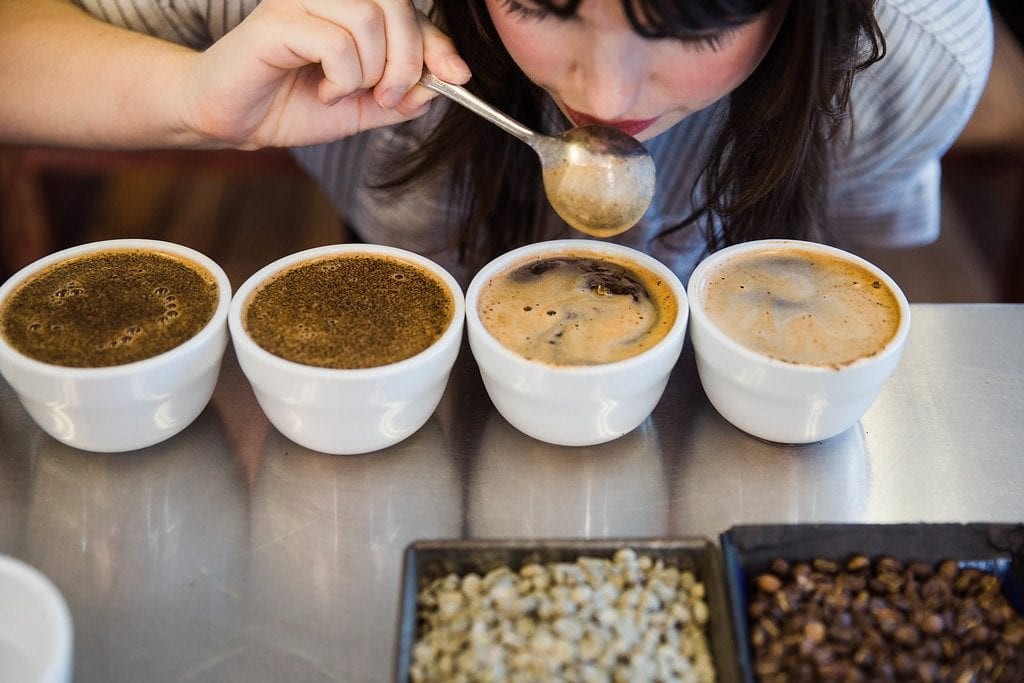Quality is defined as “the standard of something as measured against other things of a similar kind or the degree of excellence of something.”
In that sense, the concept of quality coffee is relative and totally subjective. It takes into consideration the presence and absence of several desirable characteristics and some not so desirable characteristics. Characteristics include – acidity, aroma, flavour, caffeine content. These characteristics are determined from a variety of points along the coffee production chain inclusive of type of bean, type of soil & environment, date of harvest and type of roast.. There are a number of studies which focus on the coffee markets and what is considered as ‘quality’, these studies speak to factors such as purchasing consumer behavior and quantified consumption, as well as sustainable development and ethical consumption in line with the principles of fair trade
The Specialty Coffee Association (SCA) created the dominant system of evaluating coffee, known as Q-grading. The Q-grading systems and its accompanying certifications are managed by the Coffee Quality Institution (CQI). It was created to standardize coffee grading over the world, which meant it had to overcome some of the subjectivity of taste. The Q-grading standards are also designed to distinguish specialty coffee (Q-score 80) from lower quality coffee.
In fact, when we look at the importance of quality as
a factor of differentiation of coffee, we are not limiting ourselves to
high-quality coffee or roasted coffee but a spectrum of qualities – for
example, from "very bad" to "very good" – that includes
several intertwined factors. Consumers of all strata want to know that they
will receive good value for what they pay for, and there is a wide range of
coffee qualities that can attract different consumers with different economic
realities and price points.
It is intriguing to note the difference in how quality is defined by the
consumer vs that of the coffee shop owner and the barista. Customer answers about quality focused primarily on
the end-product, that is, the cup of coffee they receive from the barista.
For the customer they expect
coffee to be brewed properly and are able to identify when it is not. Many consumer enjoy trying coffee with unique
flavors and like trying something new and as such often prefer a wider variety
of bean and coffee roaster options. In
contrast, coffee shop professionals speak to sourcing, serving, and everything
in between as it regards quality.
Regardless of your background
however, be it, roaster, barista or consumer many agree that roasting, brewing,
and freshness are key to quality.
While coffee is a commodity in terms of
international prices, there are significant differences in the qualities of one
roasted coffee versus another, as well as in the quality of one soluble coffee
versus another.
How Coffee is Graded
The Q system uses a standard and universal language to
evaluate coffee at both the export and consumer levels, first certifying coffees
as specialty or not, and then awarding a score on a 100-point scale. (Coffees
with a score of less than 80 are classified as commodity, i.e., they are not specialty
coffees.) Q certified coffees attract premium rates for farmers and exporters
and allow green-coffee purchasers to pick by score and other criteria to
provide roasters with the richness of alternatives we experience as coffee
consumers in cafés and on store shelves—across origins, processing techniques,
and coffee types.
And this only applies to Arabica coffees! There
is a whole distinct system in place for the Robusta coffee species, which are
tougher plants than Arabica but far less desirable in terms of flavor. Overall,
either Q-grading systems rely on about 5000 trained Q-graders worldwide to give
gradings on coffee through rigorous methodologies known as coffee cupping –
essentially, blind taste and aroma tests

Barista
Many coffee professional believe Barista training significantly
impacts the consumers view and in fact the actual reality of ‘quality coffee’. With
tens of thousands of dollars worth of specialized equipment in coffee shops,
and trips to all corners of the world to source the best beans, how could
quality boil down to how well a shop trains its baristas?
Quality beans or roasting means little if the
maker of the coffee lacks the skill to deliver all the flavours and notes
efficiently. Barista training completes the pipeline of quality from producer
to consumer. More quality baristas will go a long way to strengthening a
popular coffee culture in coffee-producing countries.
This
may be so because the barista impacts every factor that the consumer / customer
at the coffee shop deem most important for quality inclusive of:
The barista can literally make or break the customer experience with the coffee served. Here are a few tips for your barista training: